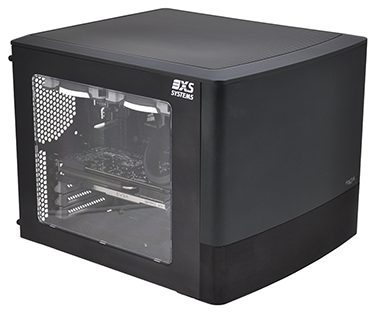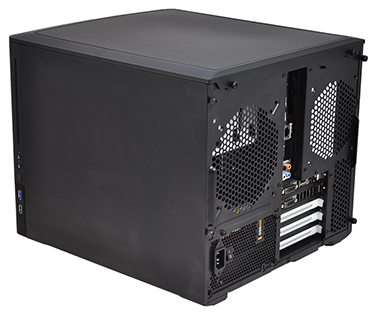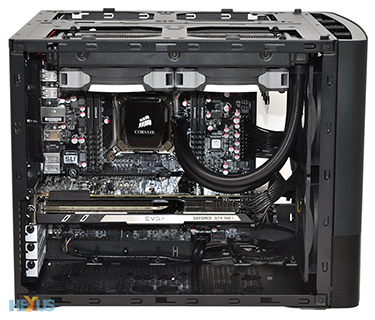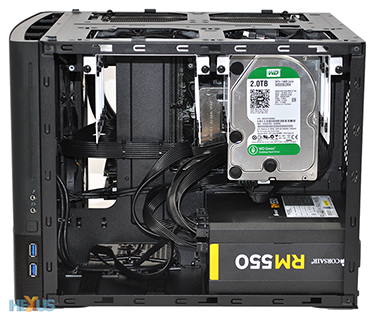Introduction
The arrival of a new enthusiast processor from chip giant Intel tends to send a re-energising shockwave throughout the industry. Such parts are seen as a critical opportunity for a massive array of partners, all of whom are looking to profit from the potential of Intel's very latest technology.
Riding the wave of Haswell-E, system integrators are this week lining-up to introduce high-end turnkey PCs based on the Core i7-5820K, Core i7-5930K or Core i7-5960X. Said chips tout six or eight cores, with hyper-threading to boot, and come to market with a new supporting chipset and long-awaited DDR4 memory. Opportunity beckons, and Scan Computers is racing out of the gate with the 3XS X99 Micro.
As the name suggests, this isn't your typical full-blown enthusiast tower, as Scan seems keen to prove that today's high-performance platforms lend themselves well to small-form-factor builds. And thanks to Haswell-E, they don't come any more powerful than this.
According to Scan, the 3XS X99 Micro is "ideal for taking to LAN parties or people who simply want a more compact PC," and as you might imagine, there's enough graphics horsepower to "ensure silky smooth frame rates in all games."
You wouldn't know it just by looking at the chassis alone, as Scan's enclosure of choice is a staid Fractal Design Node 804. It's a solid choice for users wanting a performance PC that's sleek in appearance, and there's plenty of room for high-end hardware inside.
Our review sample is packing a six-core, 12-thread Intel Core i7-5820K processor sat atop an EVGA X99 Micro motherboard and accompanied by 16GB (4x4GB) of Corsair Vengeance LPX DDR4-2666 memory. Squeezing extra performance from the 'budget' Haswell-E part, Scan runs the chip at 4.25GHz on all cores, and has a customised Corsair H100i cooler at hand to keep everything operating smoothly.
The CPU, memory and motherboard are the key talking points and very few vendors have Micro-ATX solutions available from the get-go, making EVGA's board a go-to solution for smaller X99 builds.
Padding out the rest of the specification quite nicely, Scan opts for an EVGA GTX 780 Ti SuperClocked ACX graphics card, a 550W Corsair RM550 power supply and a 500GB Samsung 840 Evo SSD. A 2TB WD Green hard disk is included for secondary storage, and making full use of the chassis' capabilities, a slot-loading DVD Writer is also installed as standard.
Scan's integration is good - the whole build is tidy with good attention paid to cable management - and it's hard to fault the component selection. One interesting point, however, is that certain manufacturers appear to be cutting the cost of their GeForce GTX 780 Ti cards. Choose to have the 3XS X99 Micro outfitted with a Zotac GTX 780 Ti instead and you can save roughly £100 - that's worth knowing about, and the price cut seems to suggest that next-generation Nvidia hardware is just around the corner.
On the subject of price, how much is a system as powerful as this going to set you back? Well, it's expected news. Haswell-E, DDR4 memory and X99 motherboards are all premium parts, and putting them together gives the 3XS X99 Micro a lofty price tag of £1,899.
For that kind of money we'd expect high-performance perfection, but our own experiences with X99 hardware suggest that not everything is as smooth as it should be at this early stage. Despite regular BIOS updates over the past week or two, we've come across various bugs on boards from multiple vendors, and the EVGA on show in Scan's system has niggles of its own.
At present, the BIOS, which admittedly is still in beta, doesn't always retain the overclock settings and has a tendency to reset the CPU multiplier. And in order to get the DDR4 memory working at the specified 2,666MHz, Scan has had to use a 125MHz base clock, which isn't ideal*. Our own conversations with motherboard manufacturers tell us that they're all hard at work trying to resolve such issues, but it's important that end users realise that X99 is relatively immature as a platform, and from a usability standpoint, isn't as polished as readily-available Z97. EVGA, meanwhile, plans to release a BIOS today curing many of these first teething problems.
Still, that's the price you usually pay for cutting-edge tech, and if performance is stellar, a few early BIOS quirks aren't going to deter the hardened enthusiast. Let's move on to the benchmark results and see what the 3XS X99 Micro can do.
*[Update] HEXUS has been informed by EVGA that a new BIOS release will be made available later today for compatibility with higher-speed DDR4 memory.













